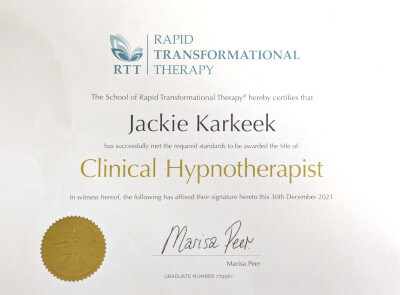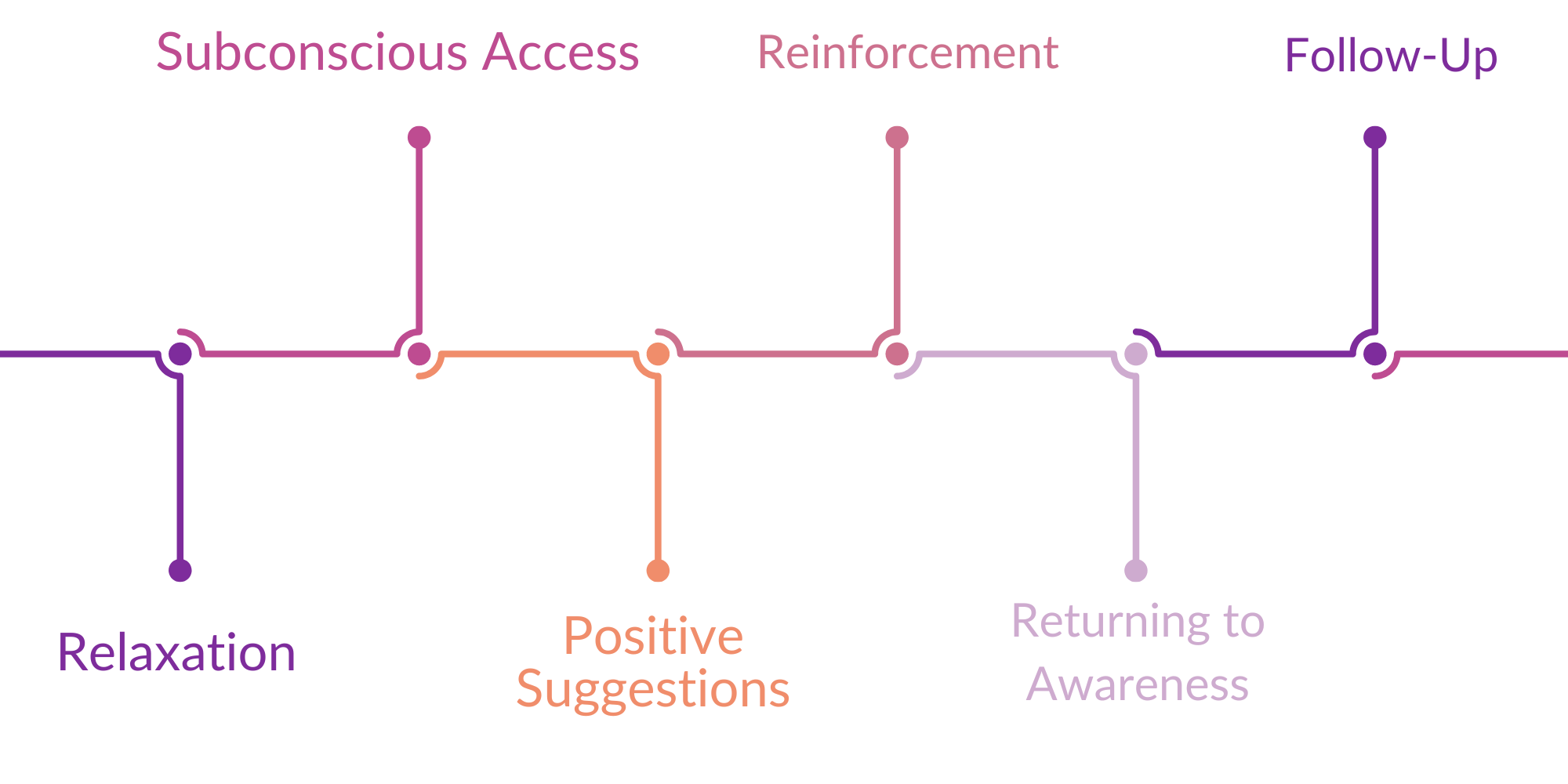
Lasting Change with Clinical Hypnotherapy
Jackie Karkeek | C.Hyp, RTT®, HPD, DipCAH, CHBP
Overcome stress, anxiety, habits, and other challenges using deeply relaxing and therapeutic hypnosis methods
- Online
- In person (Exeter and Exmouth)
I could feel all my anxiety coming out of me; it was the most amazing experience. My mind was clear of all worries. – PO, UK
about clinical hypnotherapy
Clinical hypnotherapy has been supported by research as an effective intervention for various psychological conditions. It works by inducing a state of focused relaxation, enabling the reprogramming of negative thought patterns and the reinforcement of positive behaviours. This approach can benefit those dealing with anxiety, phobias, addictions, and other mental health challenges.

how does Hypnotherapy work?

testimonials
JW, Exmouth
I can't thank Jackie enough for the incredible transformation I've experienced. I came to see her overwhelmed by anxiety, driven by a tough situation at work.
From my very first phone call with Jackie, I felt understood and reassured. She has a warm, professional manner that put me at ease, and I felt listened to. During our sessions, I felt safe and supported as she helped me work through the effects of my anxiety and depression.
The change has been remarkable. Since seeing Jackie, I wake up feeling genuinely positive about the day and time ahead - something I hadn't experienced in such a way before. My anxiety levels have dropped dramatically, and I now have practical tools to manage any worries that do crop up. My family has commented on how much calmer and happier I seem.
If you're struggling with anxiety or feeling stuck in negative patterns, I cannot recommend Jackie highly enough. She's given me a sense of optimism and joy in life. Absolutely brilliant!
Sam B
Leah Stone, Exeter
WOW… Firstly can I say that I’ve seen many hypnotherapists over the years and spent ££££ off pounds to still feel anxious and on edge. I was beginning to think this was my life.
My problem was driving anxiety and extreme general anxiety. But I can honestly say that I haven’t felt anxious driving since the day I left Jackie’s.
I feel calm confident and relaxed and I thank Jackie wholeheartedly, as for ten plus years, I’ve been a shadow of myself.
Time isn’t an issue for Jackie, so nothing feels rushed. If anyone like me is reading this and suffers with anxiety, invest in yourself. RTT works!! I now feel genuinely happy for the first time in a long time
Thank you Jackie x
Nina Johnson, Exmouth
At the time I consulted Jackie, I was in a heightened state of anxiety and my thoughts were stuck in a destructive loop.
During the initial hypnotherapy session, I was sufficiently relaxed to be receptive to the content which was programmed to my specific situation..
What has also proved to be very valuable were the coping strategies she taught me and the handouts to take home to refer to.
I have since, started to view things in a very different way and now, when faced with challenging thoughts or situations, thinking of her words of positive encouragement, has acted like a talisman for me.
Based on my experience, I would recommend Jackie’s services without hesitation.
Lindsay Popovitch, France
There are many different kinds of therapists (and over the years, I have tried many,) to help with my intense and ongoing grief over the loss of my daughter, along with a great deal of long-held anxiety.
I found Jackie to be warm, intelligent, perceptive and sensible, and the hypnotherapy, surprisingly to me, was both a doddle and extremely effective!
I felt very comfortable in Jackie’s company and able to really open up and start to learn how to carry my grief lightly. It was a really positive experience and I cannot recommend Jackie highly enough.
Interestingly, I then recommended my partner, (a man of few words,) so she could help him with his deep-rooted anxieties. After a couple of sessions with her, his comment to me was, “She has restored my faith in the shrink trade.” Believe me, that is a huge compliment coming from him!
Betsy Crocker, UK
Jackie is brilliant. She is professional and trustworthy. I wanted to work with her because I loved her energy and thoughtfulness.
I struggled with self confidence and stress, having had life changing experiences in the past and hadn’t found the best way to deal with them. My anxiety was growing!
Since having hypnotherapy with Jackie I now have the tools to stay calm and deal with situations when they arise. I enjoy these sessions and plan on seeing Jackie once a year.
My relationship with my partner has changed completely and so has my relationship with myself.
AL, UK
When I found Jackie’s website I knew my search for a hypnotherapist was over. I could tell that she would understand my problems and that she would be able to help me. I was right!
I’d had an intense couple of years of stress which had left me volatile, erratic and not myself. There was no reason for me to be like this anymore, yet as much as I tried, I couldn’t snap out of it. I could see the detrimental effect on my life and entire family.
After seeing Jackie I finally came off the rollercoaster of anxiety! I felt calm, with greater clarity and perspective. I found I could access all the happy hormones and not just all the stress hormones. The unexpected benefit was that I found I stopped procrastinating in situations where it had become a terrible habit.
Thank you Jackie for liberating me! You’ve been incredible.
SDJ, Lympstone
I am atopic and have had a lifelong issue with allergies of various kinds including dermatitis. Due to a number of concerns and stresses in recent months I had a flare up of severe dermatitis on my hands which I neglected as I was busy with family and then when I did consult my GP, and sent photographs, was initially given incorrect medication so that the condition got worse, became infected and continued for over 2 months. It was also accompanied by an immense amount of anxiety on top of the itchiness and pain. By the time I saw Jackie my hands were improved but were still flaring up as my anxiety continued. I have had just one hypnotherapy session so far and as a result I feel like a different person. I have lost my anxiety and because of this my hands remain good.
GT, Surrey
Jackie is a highly professional and deeply knowledgeable therapist. Her emphatic personality combined with a strong desire to help the patient to explore and subsequently address uncovered issues, had a real impact on me in working through my own challenges.
I would strongly recommend Jackie. She has made a substantial impact on my well being for which I am most grateful.
Stephanie, UK
‘I found the hypnotherapy sessions with you wonderful, healing and calming. My dreadful anxiety feelings
disappeared and I felt well and confident. Having been hypnotised by you, imparts the most wonderful secure feeling. Your sessions supported me all through January and February, those being my low, hibernating periods of anxiety.’ I thought I would fall apart during our big move with so many problems to face, but no – I think the expression is, ‘duck to water!’ Your therapy, I am convinced, carrying me through.’
Trevor, UK
Being a current client of Jackie's, I can wholeheartedly recommend her great work. My circumstances, in brief, were that I had been diagnosed with early osteoarthritis. I underwent several surgical procedures over two years inclusive of two spinal fusions. I lived with daily pain which led to depression and anxiety. My self-confidence and esteem dropped. I went from an independent, outgoing, capable senior leader to someone who was insular, deeply unhappy and unable to see a positive way forward.
I made contact with Jackie and her help has been transformational. She brings a unique blend of compassion, confidentiality, trust and an ability to distill down the various issues and then design an effective plan of attack. She is not ruled by the clock, gives value for money and is always contactable for any follow up.
Paul O’shaughnessy, UK
I’m writing this review as I couldn’t thank Jackie enough for what she has done for me. Literally hypnotherapy has turned my life around.
I went to see Jackie after a break down.I was struggling with depression, anxiety and insomnia. I was at the lowest point I’ve ever been and after one session the difference was unbelievable.it was almost like an out of body experience. I could feel all my anxiety coming out of me, it was the most amazing feeling - my mind was clear of all my worries.
I had 2 more sessions afterwards focusing on my sleep. Before I went to see Jackie I was lucky if I was sleeping 3 hours a night now I’m getting anywhere between 5-7 hours of solid sleep the turn around has been amazing. She’s also helped me regain my confidence and I am now able to focus again on all the positives in my life. I couldn’t recommend Jackie enough. No matter what the problem is, I’m sure Jackie can help.
Fiona and Dave, UK
Having been a first time mother with no prior experience of childbirth, and only an acute fear of the unknown to shape my attitude towards the upcoming event, I can highly recommend hypnobirthing. When I discovered I was expecting I was over the moon but feared that my dreams of a natural water birth would be unobtainable, especially for a first birth. I was also keen to avoid a hospital birth as I have never felt comfortable in a clinical environment and didn’t think this would make my first experience of childbirth as positive as it could be.
The sessions were as factually informative as they were uplifting. It was clear that Jackie had a wealth of knowledge in this area and that also gave me confidence in the course. We tapped into my specific fears surrounding birth and dispelled them.
Ultimately the birth of my son was a resoundingly positive experience. I achieved the birth I had hoped for and honestly believe this is because I used hypnobirthing in my preparation.
Margaret Phillips
Well to cut a long story short, I have had a lifetime of anxiety, panic attacks and all that goes with it. At its worst I couldn’t eat, sleep, or function probably. I was on lots of meds etc. My confidence was in shatters, until I found the courage to go and see Jackie.
I was desperate for help. Jackie had been recommended to my partner and he was also at his wits end with the situation. He made that first call and then I went on to speak to Jackie myself by phone. She gave me the reassurance that she could help me and I felt that trust and bond with her immediately.
After a few consultations and at 63 years of age I finally got to the bottom of things. Jackie was amazing, so professional, caring and dedicated. She in fact, turned my life around with her determination to really help people.
I actually feel alive and happy again and my confidence is growing by the day. I am now ready for whatever life throws at me.
Thank you so much Jackie.
Brendan Gearan, Exeter
What can I say? After being diagnosed with Multiple Sclerosis I suffered what can only be described as enormous anxiety, lasting for six months or more. After having counselling, that didn't really achieve the desired results, I gambled on hypnotherapy. I am really glad that I saw Jackie. She changed my life, literally. Jackie has a way to make you feel safe and secure, whilst almost secretly fixing the issues in your mind. If you're unsure, take my word, Jackie is fantastic, you are not gambling with Jackie. Eleven out of ten.
Amy, UK
Jackie is a brilliant hypnotherapist. When I spoke to her initially, she was very warming and made me feel at ease. I went to Jackie as I was suffering from chronic pain in my hip and back area and was awaiting chronic pain treatment to have a spinal cord stimulator. I was very depressed at times and was not coping brilliantly, but every session seemed to relax me and mentally prepare me for dealing better with my chronic pain levels at the time.
I would highly recommend Jackie as a hypnotherapist, particularly for helping manage chronic pain or any form of pain that can have a debilitating influence on quality of life. I am pleased to say I have now had a Spinal cord stimulator fitted which has cured my chronic pain and better management of other related issues. Thank you so much Jackie for your sessions in the intervals when my chronic pain was at its worst, your sessions really helped me physically, emotionally and psychologically and I will always fondly remember you!
Elaine Blackshaw, Exeter
Jackie's incredible ability has changed my life. After many years of driving I suddenly developed a complete fear of getting in the car and driving. On the occasions when I had no other choice I felt sick, panicky and totally stressed for days leading up to the drive when I knew in advance I had to make a journey. I would even plan the journey over and over again in my mind wondering what problems I might encounter. I searched the internet and found Mind in Motion site which immediately attracted me as it was very comprehensive. One telephone call to Jackie gave me the reassurance that she could help me. I am delighted to say that after only three sessions I am completely relaxed, no sign of any panic, stress and most of all it has given me back my self esteem and made me feel so much better and can drive anywhere at home or abroad quite happily.
If, like me, you have similar concerns, pick up the phone and you will not regret it for one moment.
Angela Holland
I am delighted with Jackie’s fantastic work to cure my public speaking phobia of 42 years. I immediately felt at ease with her and able to open up and trust her completely. Her support and encouragement is brilliant, she genuinely wanted me to accomplish my goal. I would definitely recommend you see Jackie with any phobias or insecurities that are holding you back in life. You will know from the first phone call that it’s a great decision.
LP, Exeter
Thank you for the sessions I had with you, I felt extremely calm, relaxed and in more control of my future as a non-smoker. For anyone who is struggling to stop smoking I highly recommend booking in an appointment with Jackie, she will put you at ease immediately. I have not had hypnotherapy before, so didn't know what to expect but left my session feeling so positive and upbeat.
Sandi, UK
I felt completely at ease when I went to see Jackie for hypnotherapy. She has a lovely calm manner and really took time to listen to what I wanted to achieve with hypnotherapy. She has a very relaxing voice and the whole experience left me feeling calm, relaxed and positive. Thank you Jackie for a very uplifting experience and the positive results I achieved after my sessions with you.
PRICE
£125 Single Session
£220 Double Session
Book a free discovery call: 07922190964
Includes:
Free 30 minute discovery call
Pre-session primer recording, for use 1 week prior to appointment
A double session is recommended for the first meeting (£220)
Ideal for creating mindset change, enabling you to efficiently manage anxiety, stress, and low self-esteem with renewed confidence and self-belief.
Target specific issues, such as extreme anxiety, fear, anger management, habits and addictions, social anxiety, confidence and self-esteem, along with many debilitating physical conditions.
Neuroscientific tips and exercises for you to use at home to further embed the learnings you have made in session
Everyone has inside them a piece of good news. The good news is that you don’t know how great you can be! How much you can love! What you can accomplish! And what your potential is.
– Anne Frank

frequently asked questions
The therapist will guide you into a relaxed state, in which your subconscious mind becomes open and receptive to change. During this state, the therapist uses positive suggestions and reinforcement, along with techniques like visualisation, to help you replace negative beliefs and behaviours with more positive ones, enabling you to make plans and create goals for the future.
The number of sessions varies, depending on the individual and the specific issue being addressed. Some clients see significant changes after just a few sessions, while others may benefit from ongoing therapy.
Yes, hypnotherapy is a safe and non-invasive therapy, when conducted by a qualified professional. It is a natural state of focused relaxation, where you remain in control throughout the session.
No, you will not lose control during hypnosis. You are in a heightened state of focus and relaxation, but you remain aware of your surroundings and can end the session at any time you choose.
Most people can enter a light hypnotic state, which is enough for therapeutic work. However, a deep level of hypnosis is not necessary to achieve positive results. Your willingness and openness to the process plays a significant role in its effectiveness.
Many clients notice changes after the first session, with ongoing improvement over subsequent sessions. The speed of results can depend on the individual, the issue being addressed, and the goals of the therapy.
During a session, you will be guided into a relaxed state, which feels similar to being half way between waking and sleep. The therapist will use techniques like guided imagery and positive suggestions to help you achieve your goals. The session typically lasts about 60 minutes.
Come with an open mind and be prepared to discuss your goals and any specific challenges you want to address. Be sure to wear comfortable clothing and to arrive with a willingness to engage fully in the process.
After the session, you may feel relaxed and calm. The therapist might provide recordings, or suggest practices like mindfulness or self-hypnosis, to reinforce the therapy and support ongoing change and may also provide handouts for your use in between sessions.
